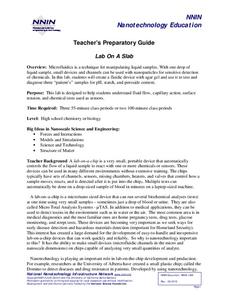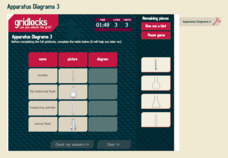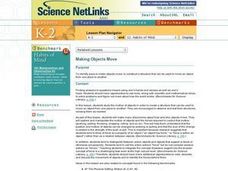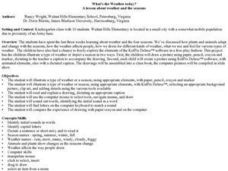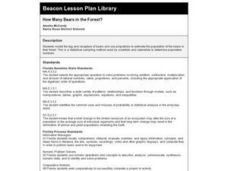Curated OER
Teaching About Plate Tectonics and Faulting Using Foam Models
Young scientists learn about plate tectonics and the three different types of faults (normal, reverse, and strike-slip) using foam models. The activity also covers common types of locations where these faults are found.
Curated OER
Multiplication Strategies - A Day at the Zoo
This is an amazing 33-page resource for teaching multiplication! Your mathematicians will discover the connection between multiplication and repeated addition. They also will work collaboratively with arrays while studying zoo animals....
Royal Society of Chemistry
Extraction of Copper
Is copper found as a raw material? Science sleuths manipulate the reactants and products found in the copper extraction process in a series of fun puzzles. The interactive engages learners in pairing formulas with their names while using...
Curated OER
Using Environmental Models to Determine the Effect of Acid Rain on an Ecosystem
Demonstrate to your middle school science learners how chalk breaks down in a weak acid. Discuss what affects acidic rain might have on ecosystems. Lab groups then choose one of two questions: "How does acid precipitation affect an...
National Nanotechnology Infrastructure Network
Lab On A Slab
Capillary action is the frugal chemist's dream ... the less liquid used, the more tests they can run! Learners experiment with the best design to maximize the benefits of capillary action. Using a liquid sample, they design a capillary...
Royal Society of Chemistry
Apparatus Diagrams 3
Glassware everywhere! How do you help scholars learn to identify the different types of laboratory glassware? Introduce them to some of the main tools of the trade through interactive puzzles. Users match and manipulate items based on...
Curated OER
On the Trail of the Hudson's Migratory Fish
Using data related to the fish in the Hudson River area, learners calculate distance, elapsed time, and growth. They learn about migratory fish, the life cycle of a fish, analyze a map, and answer questions.
Curated OER
Vector Manipulation Unit
Students are introduced to the concept/idea of a vector, what it represents and why they are used. They develop an understanding of what vectors are, how and why they are used.
Ahisma Summer Institute
The Power of One - Math in a Different Angle
In this 2-day lesson focused on exponents, middle schoolers will cross the curriculum by engaging in science, history and language arts activities. Exponential growth will be explored using grains of rice on a chess board. Exponential...
Curated OER
What's Down There?
Investigate the coral reefs around Mokolai Island, Hawaii by researching and writing about improving the reef ecosystem. Students map threats to the ecosystem and use the list of key words to assist in their descriptions
Foundation for Water & Energy Education
How Can Work Be Done with Water Power? Activity C
Third in a set of lessons regarding reservoirs, dams, and hydropower, this involves a two-day hydropower plant simulation. Collaborative groups build, maintain, and finance the plant. The transparency of the reservoir setup can be...
Curated OER
Elements of Biology: Genetics
High schoolers study genetic manipulations and identify the solutions that could help to solve a problem. In this genetics lesson students divide into groups and research genetics for a debate.
Curated OER
Ants
Young scholars make sequential patterns by using ants and following the model. They identify different parts of an ant by matching the picture to the word name. Pupils identify the ant's life cycle by creating a chart using pictures.
Curated OER
Modeling the Keeling Curve with Excel
In this modeling the Keeling Curve worksheet, high schoolers use given data beginning in 1960 to create a mathematical model for the changes in atmospheric carbon dioxide over time. Students manipulate the equation to predict the carbon...
Curated OER
Dissecting Frog Embryos: Cell Membranes and Mitosis
Students use high powered dissection microscopes to dissect and examine frog embryos as well as see balls of cells that were produced by rapid division. The concept of mitosis links to the lesson.
Curated OER
Unit 2 Sun & Stars
Young scholars describe stellar objects using terms such as stars, planets, satellites, orbits and light. For this sun and stars unit, students research stellar objects through seven individual lessons discovering star characteristics,...
Curated OER
How Do The Colors of Light Mix?
Students investigate the mixing of light. They form a hypotheses to reason why color changes occur and they write conclusions and ask new questions arising from the investigation. Students identify the primary and complementary colors of...
Curated OER
Making Objects Move
Students will make many discoveries about how and why objects move. They will explore and manipulate the motion of objects and the forces required to control that motion (pushing, pulling, throwing, dropping, rolling, and so on). This...
Curated OER
Weather And The Seasons
Students illustrate characteristics of the different seasons using digital and pen and paper drawings. They creat captions for their drawings and present them to the class. Students compare and contrast their pen and paper drawing...
Curated OER
"SMART" Science
Seventh graders explore science topics using a SMART board. In this respiration lesson, 7th graders see how and why cells use cellular respiration. They see a cellular respiration recipe on the SMART board and watch as the cells produce...
Curated OER
Drosophila Melanogaster
Student manipulate flies, examine their external anatomy, begin a fly journal and make cultures of wild type flies. Students cross wild type flies and mutants, both purchased from a biological supply house (Carolina Biological Supply...
Curated OER
Structural Changes in a Protein
Young scholars observe and manipulate the structure of a protein. They form an alpha helix, a beta sheet, and add disulfide bonds. They create a multimeric protein and compare their location with other students.
Curated OER
Drosophila Melanogaster
Pupils manipulate flies, examine their external anatomy, begin a fly journal and make cultures of wild type flies.
Curated OER
How Many Bears in the Forest?
Third graders model the tag and recapture of bears and use proportions to estimate the population of the bears in their forest. This is a statistical sampling method used by scientists and naturalists to determine population numbers.




